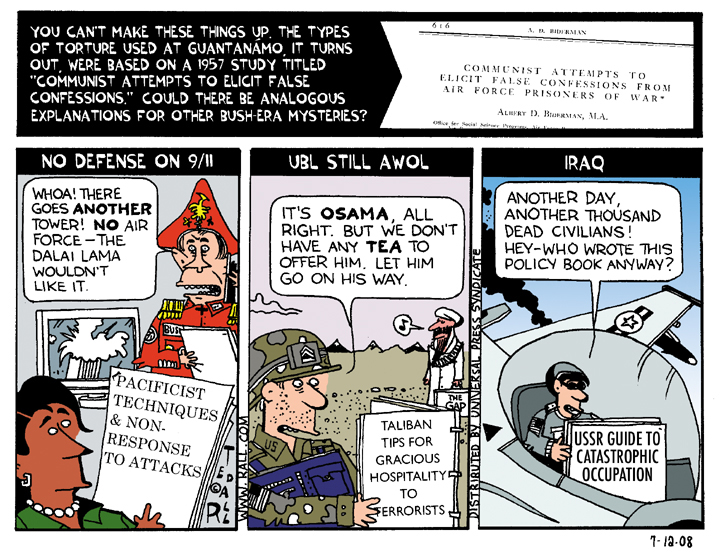So much for change you can believe in: the torture continues at Gitmo and will continue at least another year. And nary a word about the NSA’s despicable warrantless wiretapping and espionage program against American citizens.
SYNDICATED COLUMN: Will Obama Wuss Out on Gitmo?
Prez-Elect May Ratify Bush’s Torture Trials
The accused terrorist appeared before the military tribunal, charged with conspiracy in a plot against national security. Because state secrets were involved and because harsh interrogation techniques were used to extract information, the defendant was deprived of a look at the evidence. Also denied were the defendant’s traditional right to a lawyer, to face accusers, even to see the judges–they wore hoods.
No, this wasn’t at Gitmo. This “court” met in the military dictatorship of Peru. And the defendant wasn’t an Afghan or Arab turned over to U.S. troops by a warlord out for the $10,000 bounty. She was Lori Berenson, a 31-year-old American citizen accused of aiding the Túpac Amaru Revolutionary Movement, members of whom she befriended.
The Washington Post and New York Times condemned Berenson’s 1996 trial, calling the tribunal and the brutal circumstances of her detention a mockery of justice. In the U.S., most American liberals agreed.
Now President-Elect Barack Obama–a self-identified liberal Democrat who campaigned as a champion of human rights–wants to use the same kind of kangaroo court to try victims of the notorious Guantánamo torture camp.
Obama’s advisers confirm that the incoming president wants to close Gitmo. It’s long overdue. But they deny that they’ve made a final decision about what to do with the detainees. (There’s no word about the secret prisons, Navy prison ships or CIA black sites where thousands of Muslim men kidnapped by the U.S. have been “disappeared.”) However, there’s troubling evidence that Obama is reneging on his promise to do the right thing by the long-suffering detainees.
Insiders say that Obama is leaning toward the creation of “national security courts”–secret military tribunals where detainees would be tried without basic due process rights. They wouldn’t get the right to review evidence against them, cross-examine prosecution witnesses, or—obviously, at this point–a speedy trial. Moreover, Obama hasn’t ruled out subjecting future detainees to “preventive detention”–i.e., holding them without charges, like Bush.
“The legal team advising Mr. Obama on Guantánamo believes that prosecuting the ‘high value’ terror suspects such as [Khalid Sheikh] Mohammed–a group of about 30–will require the creation of a court designed to handle highly sensitive intelligence material, a cross between a military tribunal and a federal court,” reports The Times of London.
“What a national security court is designed for is to hide the use of torture and allow the consideration of evidence that is not reliable,” says J. Wells Dixon of the Center for Constitutional Rights, which represents some of the detainees.
Of the 255 prisoners, about 60 have been cleared for release but remain at the base because their home countries, including China, view them as political enemies and might execute them. Of the remaining 195, the Pentagon admits that there’s no evidence whatsoever against 135. Obama’s team doesn’t know what to do about these 195 misérables.
That leaves 80 men, including the 30 “stars” like KSM, the alleged 9/11 mastermind. “If Obama wanted to move as swiftly as possible to close Guantánamo,” reports Time magazine, “the strongest step he could take as president would be to simply shutter the camp by executive order and transfer all of the detainees to prison sites inside the U.S. At that point, in theory, the detainees would face four possible fates: being charged with offenses that could be tried in federal courts; court-marshaled according to the Uniform Code of Military Justice; turned over to the governments of their native countries; or simply released.”
Courts-marshal of the detainees, who were dumped in Gitmo’s supposed legal limbo specifically in order to deny them POW status and Geneva Conventions rights, would be bizarre. As discussed above, many can’t go home. Moreover most, if not all, of the high-profile detainees were tortured–a fact that would almost certainly destroy any chance of obtaining a conviction in a fair trial.
You can’t hold a fair trial after holding a suspect for years while depriving them of access to a lawyer, family visits, or the ability to prepare for trial. The Founding Fathers understood this fact, which is why they ratified the Sixth Amendment to the U.S. Constitution. “In all criminal prosecutions, the accused shall enjoy the right to a speedy and public trial,” reads the Sixth. A secret “national security court” held six years after “arrest” doesn’t come anywhere close to satisfying this requirement.
Municipalities’ interpretation of the Sixth Amendment varies. In New York City, cops have to bring you before a judge for arraignment within 24 hours of your arrest, or let you go. Other places allow a few days. Six years? Not even in Texas.
There’s only one valid legal and moral option for rectifying the human rights nightmare at Guantánamo. On January 20, President Obama should fly to Gitmo, address its inmates and personally apologize to each one for the abuses and indignities they have suffered, and which have brought shame and contempt upon the United States.
The detainees should be set free. They should be paid enough money that they should never want for anything again, then offered the right to fly home or, if they prefer, anywhere in the U.S. Finally, Obama should walk out the camp’s main entrance to Palma Point, where he should sign over control of the base to Cuban President Raoul Castro.
COPYRIGHT 2008 TED RALL
SYNDICATED COLUMN: President Obama—Shut Down This Camp!
Next President Should Shut Gitmo on January 20
* Camp has become its own raison d’être
* Hundreds locked in legal limbo
* Jerking around detainees and their families
* Gesture would resonate around the globe
François Mitterand brought civilization to France. One of his first acts as president was to end the death penalty. A guy named Philippe Maurice had his date with the guillotine cancelled.
Amazing but true: the country that gave the world “The Rights of Man” was still lopping off heads in 1981.
Fortunately, things change. Other countries followed France’s lead. Today, just a quarter century later, fewer than a quarter of the world’s nations still carry out capital punishment. Nations that do can’t get into the European Union.
Our next president–probably Barack Obama–has a similar opportunity to create a transformative moment toward a fully civilized United States. I’m not talking about abolishing executions, though that is long overdue. President Obama (or McCain) should close Guantánamo.
Not after appointing a commission to look into it. Not after finding a nation willing to take the detainees. Like Mitterand, he should do it immediately.
After years of denial, Bush Administration officials now admit that hundreds of men and children–as young as 13!–have been tortured and otherwise abused at Gitmo. Inmates were penned up in dog cages, denied exercise, and waterboarded.
One guard vehemently denied urinating on a prisoner’s Koran. His defense? “The guard had left his observation area post and went outside to urinate,” according to a Defense Department report. “He urinated near an air vent and the wind blew his urine through the vent into the [prisoner’s cell].” You see, he wasn’t trying to pee on the Koran. He was trying to pee on the prisoner. His urine stream had inadvertently splashed off the man onto the book.
Not surprisingly, a lot of the inmates–who’d been sold to U.S. troops by Afghan warlords, locked up for years without being accused of anything, denied access to an attorney or their families, denied most of all of hope–freaked out. Some hung themselves. Others went on hunger strike. The military’s response? Suicide, they said, was a diabolically clever act of “asymmetrical warfare.” They strapped the hunger strikers into special chairs, pried open their jaws and jammed feeding tubes down their throats so roughly that they vomited blood.
Most of this kind of fun, the government claims, no longer happens at Club Gitmo. But there’s no way to verify that. Reporters and human rights groups are denied access to the facility and its misérables. Wherever there’s a secret, there’s something to hide. Like the detainees, Guantánamo should be presumed guilty until it is proven innocent.
Life at Guantánamo has entered a weird second phase. Originally dedicated to the forceful extraction of information about impending terrorist attacks, prisoner interrogations now torture inmates in order to obtain information on activities within the camp itself. “The primary focus is the safety of the detainees as well as the detainee guard force, and that’s why we have this intelligence activity,” said the camp’s commander, Navy Rear Admiral David Thomas in August. In other words, the circumstances of the prisoners’ incarceration necessitate further incarceration.
Kafka would have loved it. We keep them in Gitmo, not to keep us safe, but to keep Gitmo itself safe.
As anyone who has spent time behind bars will attest, uncertainty is worse than abuse. Bruises heal; urine dries. Not knowing whether you will ever again be free to walk down a street, sit in a café or hug your children is constant torment. You deaden your emotions in order to survive, wondering whether you’ll ever be able to get them back.
Perhaps the most sinister aspect of America’s premier gulag, however, is its use and abuse of military and civilian courts to jerk around inmates and their families. The quasi-judicial system set up to process the detainees is itself a paragon of psychological torture characterized by sadistic glee and aggressive indifference.
There is, of course, the case of the Uyghurs, Muslims who live in China’s far west Xinjiang province, which is part of Central Asia. I was one of the first American commentators to champion their cause. Guantánamo’s Uyghurs are members of the East Turkestan Independence Movement (ETIM), encouraged by U.S.-financed Radio Free Asia to rise up against Chinese occupation. They obtained weapons training at camps in neighboring Afghanistan. After 9/11, however, China threatened to use its U.N. security council veto to stop the U.S. invasion of Afghanistan unless the Bush Administration threw its pet Uyghurs under the bus.
The U.S. promptly reversed its policy, not only declaring ETIM an officially-designated “terrorist organization,” but agreeing to dispatch its leaders to Guantánamo. Bush even invited officers from China’s Ministry of State Security to interrogate the Uyghurs at Gitmo, softening them up with torture before the Chinese arrived.
The Uyghur prisoners cooperated with interrogators. The Pentagon concluded they weren’t anti-American. “[The Uyghurs] were transferred to Guantánamo more than six years ago and were cleared for release in 2004,” according to Newsweek.
Proven innocent, the U.S. has kept them at Gitmo for the last four years. They can’t go back to China. Why? “The U.S. government credibly feared they would be tortured.” Well, they would know.
Except for Albania, which agreed to take five Uyghurs in 2006, other countries don’t want to validate Guantánamo by accepting those released through its illegal military tribunal system. “The Bush Administration has conceded that none of the Uyghurs is an enemy combatant,” reports Newsweek. A federal judge ruled that 17 Uyghur detainees be freed from Gitmo and brought to the United States. And that should have been that.
But when it comes to Gitmo, that is never that.
Government lawyers persuaded an appeals court to stay the ruling, arguing that the 17 Uyghurs are dangerous. Get this–they’re dangerous to America because, the Justice Department argues in court documents, the Uyghurs “were detained for six years by the country [the U.S.] to which the district court has ordered them brought.” They may not have hated America before–but they might now.
This week the Pentagon decided not to pursue charges against five other Gitmo prisoners. Apparently government prosecutors were afraid that the trials–even those conducted by the military’s kangaroo courts–would publicize how people are treated at America’s Devil’s Island. “They have been cornered into doing this to avoid admitting torture,” said Claire Algar, executive director of the legal group Reprieve.
So the lucky five go free, right? Wrong. “There are no plans to free any of the men, and the military said it could reinstate charges later,” writes the Associated Press.
Bush, it came out recently, “never considered proposals” to close Gitmo. Both Obama and McCain say they want to shut it down, but neither has said when. Their reticence stems from the mentality expressed by a Bush Administration official: “The new president will gnash his teeth and beat his head against the wall when he realizes how complicated it is to close Guantánamo.”
There is nothing complicated about it. Gitmo is useless. It’s evil. It–and the secret detentions at Bagram, Abu Ghraib and elsewhere–have destroyed America’s reputation far too long.
COPYRIGHT 2008 TED RALL
Ticking Time Bomb
The commander of Guantánamo admits that U.S. interrogators now spend more time asking detainees about activity in the concentration camp than, say, actionable intelligence.<
SYNDICATED COLUMN: It’s the Torture, Stupid
Restoring Human Rights Must Be Next Prez’s Top Priority
Both major presidential candidates have promised to roll back the Bush Administration’s torture archipelago. Both say they’ll close Guantánamo, abolish legalized torture, and respect the Geneva Conventions on the treatment of prisoners of war. Obama also pledges to eliminate “extraordinary rendition,” in which the CIA kidnaps people and flies them to other countries to be tortured, and says he will investigate Bush Administration officials for possible prosecution for war crimes.
If followed by other meaningful changes in behavior–withdrawing from Afghanistan and Iraq and foreswearing preemptive warfare–restoring the rule of law and respecting the rights of “enemy combatants” can start America’s long, slow climb back to moral parity in the community of nations. But there are worrisome signs that Barack Obama and John McCain’s commitment to moral renewal is less than rock-solid.
McCain, who claimed to have been tortured as a POW in North Vietnam, says a lot of the right things. “We do not torture people,” he said in a 2007 Republican debate. “It’s not about the terrorists; it’s about us. It’s about what kind of country we are.” He used his Vietnam experience against fellow Republicans, bullying Congress into passing a law banning torture against detainees held by the military.
Bush signed McCain’s bill in late 2005, saying it “is to make it clear to the world that this government does not torture and that we adhere to the international convention of torture, whether it be here at home or abroad.”
Days later, however, Bush issued a secret “signing statement” declaring that he would ignore the Detainee Treatment Act. NYU law professor David Golove, an expert on executive power, said: “The signing statement is saying ‘I will only comply with this law when I want to, and if something arises in the war on terrorism where I think it’s important to torture or engage in cruel, inhuman, and degrading conduct, I have the authority to do so and nothing in this law is going to stop me.”
McCain, who says as president he would veto a bill rather than issue a signing statement negating its contents, was no doubt angry about Bush’s perfidy. But, fearful of alienating Bush and the GOP leadership as he geared up for his ’08 presidential campaign, he remained silent.
In February of this year, McCain backtracked still further from his anti-torture position, voting against legislation that would have blocked the CIA from subjecting inmates in its secret prisons to waterboarding, hooding, putting duct tape across their eyes, stripping them naked, rape, beatings, burning, subjecting them to hypothermia, mock executions, and other “harsh interrogation techniques.”
“The CIA should have the ability to use additional techniques,” he argued. He refused to explain why the CIA ought to be allowed to torture while the DOD should adhere to international standards of civilized behavior.
The U.S. continues to torture.
Unlike McCain, Obama remains a critic of officially sanctioned torture. “We’ll reject torture–without exception or equivocation,” Obama says. He would also end “the practice of shipping away prisoners in the dead of night to be tortured in far-off countries, of detaining thousands without charge or trial, of maintaining a network of secret prisons to jail people beyond the reach of the law.”
The trouble is, Obama isn’t laying the groundwork for stopping torture or closing Guantánamo or other U.S. gulags in his stump speeches. He talks a lot about energy policy, healthcare, jobs and the economy–and withdrawing troops from Iraq so they join the war against Afghanistan instead. If he becomes president, people will expect him to do those things. Without a sustained focus on human rights issues, however, any moves he makes will seem to come out of the blue–and face stronger pushback from Republicans anxious to bash him as weak on national security.
Why doesn’t Obama emphasize Bush’s war crimes? Maybe he’s trying to play the Great Uniter, or maybe he knows that many Americans don’t give a rat’s ass about the pain inflicted against people they’ll never meet in places they’ve never heard of. Who knows? All we know for sure is that, day after day, Obama fails to talk about what is arguably the worst crime of the corrupt Bush Administration.
Of course, renouncing torture isn’t enough. Those who authorized it must be held to account. However, it doesn’t seem likely that they will.
Asked in April whether he would prosecute Bush Administration officials for authorizing torture, Obama delivered his now-familiar duck-and-cover: say the right thing, then weasel out of it. “If crimes have been committed, they should be investigated,” he said.
But not for at least four years: “I would not want my first term consumed by what was perceived on the part of the Republicans as a partisan witch hunt, because I think we’ve got too many problems to solve.”
Memo to Barack: This isn’t about prosecuting Republicans. It’s about prosecuting torturers.
“Prosecution of any officials, if it were to occur, would probably not occur during Obama’s first term,” Slate reports, citing Obama campaign insiders. “Instead, we may well see a Congressionally empowered commission that would seek testimony from witnesses in search of the truth about what occurred. Though some witnesses might be offered immunity in exchange for testimony, the question of whether anybody would be prosecuted would be deferred to a later date–meaning Obama’s second term, if such is forthcoming.”
First would come a South African-style “Truth and Reconciliation Commission,” where the truth would come out. But the torturers would get off scot-free.
“The commission would focus strictly on detention, torture and extraordinary rendition, or the practice of spiriting detainees to a third country for abusive interrogations. The panel would focus strictly on these abuses, leaving out any other allegedly illegal activities during the Bush Administration, such as domestic spying,” says Slate. Second–well, there might not be a second. Even if there is, shortsighted Americans’ appetite for justice and accountability will probably have been diluted by the time 2013 rolls around.
Mainline media liberals, in conjunction with Obama supporters, are even going so far as to suggest that Bush issue his torturers with a blanket pardon in exchange for their testimony at Obama’s toothless commission.
Regardless of who wins in November, we will get a president who’s better on torture and other human rights issues than George W. Bush. At least their words sound nice. But real change and moral redemption will only begin if we–Democrats, Republicans and everyone else–demand the next president stands by his pretty promises.
Until they start taking taking torture, Gitmo and human rights seriously, neither Obama nor McCain should be able to appear in public without facing questions and heckling about these issues.
COPYRIGHT 2008 TED RALL







